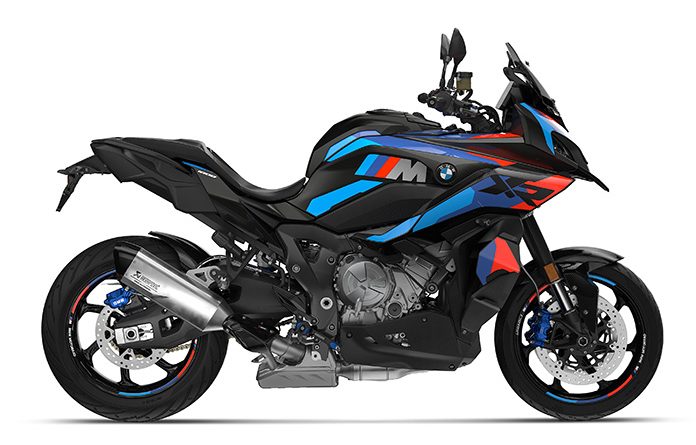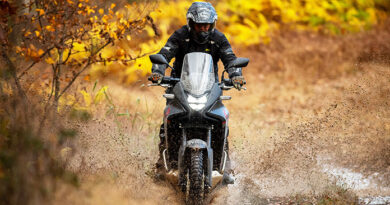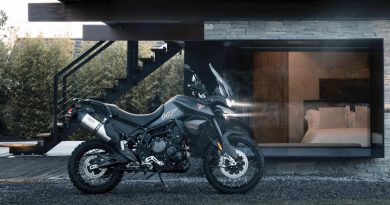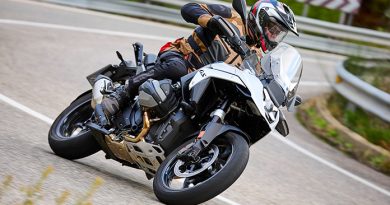2024 BMW M 1000 XR, S 1000 XR Review | First Look
BMW Motorrad has announced the release of two long-distance sportbikes for 2024. The updated 2024 BMW S 1000 XR offers increased engine power, improved ergonomics, design refinements, and expanded standard features. The new 2024 BMW M 1000 XR, which was first teased in June 2023 as a prototype, is a bike that BMW says is designed to “meet the highest demands, from dynamic riding on winding roads to long-distance touring and to time spent on track.”
See all of Rider‘s BMW coverage here.
2024 BMW S 1000 XR
The new S 1000 XR shares the S 1000 RR’s liquid-cooled 999cc inline-Four with DOHC and 4 valves per cylinder mated to a 6-speed gearbox, optimized Shift Assist Pro, and a slip/assist clutch.
Compared to its predecessor, claimed power has been increased by 5 hp to 170 hp as a result of the flow-optimized geometry of the intake runners and customized engine mapping. Peak power comes at the same 11,000 rpm, and the maximum torque generated also remains at 84 lb-ft at 9,250 rpm.
Related: 2020 BMW S 1000 XR | Tour Test Review
The S 1000 XR comes with Dynamic Traction Control, Dynamic Brake Control, Dynamic ESA, Dynamic Engine Brake Control, and Ride Modes Pro. Stopping power still comes from dual 4-piston fixed calipers grabbing 320mm discs up front and a single floating caliper and 220mm disc in the back. Integral ABS is standard, and Race ABS is linked to the ride modes. The 43mm inverted fork and rear shock have been optimized to provide a more sensitive and comfortable ride and they offer 5.9 inches of travel front and back.
From an ergonomic standpoint, the seat of the S 1000 XR has been completely redesigned. It now offers an extra 0.4 inch of seat height (33.5 inches) and provides more space by increasing the usable length and width of the seat, allowing for better adjustment of the seating position depending on the riding conditions. A total of three different seat heights are available. The handlebar clamp has also been redesigned.
The new S 1000 XR comes with an expanded standard equipment list, including Headlight Pro with an adaptive turning light. Keyless Ride and a 12 Ah capacity battery are also now standard features. Additionally, the new BMW S 1000 XR is equipped with a standard USB charging socket. Other updates include the standard Intelligent Emergency Call feature, the option to equip the S 1000 XR with the M GPS Laptrigger, and the availability of M Carbon wheels.
The new S 1000 XR also benefits from redesigned visual elements, including new side panels and air intakes on the rear section. Additionally, the radiator trim now has a textured surface, and the previously black-colored “beak” front fender is now painted in body color.
The 2024 S 1000 XR comes standard in Blackstorm Metallic 2, Gravity Blue Metallic, or Light White / M Motorsport starting at $18,190. It’s available with the optional Premium Package and M Package as well as numerous individual options and accessories.
2024 BMW M 1000 XR
At the end of 2018, BMW Motorrad introduced the M model range strategy for motorcycles and has been offering M special equipment and M performance parts since. The BMW M 1000 XR follows the M 1000 RR superbike and the M 1000 R roadster, introduced in 2020 and 2022 respectively.
Related: 2023 BMW S 1000 RR and M 1000 R | First Ride Review
“Based on the current S 1000 XR and S 1000 RR, the product substance of the M 1000 XR – M XR for short – has been tuned to meet the specific requirements of a long-distance sports bike,” said Dominik Blass, M 1000 XR product manager. “The riding dynamics speak for themselves, both on the country roads as well as on the track and on long-distance journeys.”
The new BMW 1000 XR uses the liquid-cooled 999cc inline-Four with DOHC, 4 valves per cylinder, and throttle-b-wire adapted from the M 1000 RR that makes a claimed 201 hp at 12,750 rpm and 83 lb-ft at 11,000 rpm. The M XR engine also uses BMW ShiftCam technology for an increase in torque and pulling power in the low and medium speed range with simultaneous gain in peak power. The new M XR engine offers almost the same high torque range in the lower and middle ranges as the previous S 1000 XR engine but with the same peak power as the RR. The engine is mated to a 6-speed gearbox with a slip/assist clutch.
In the rev range above 10,000 rpm, which is relevant for supersport riding as well as for use on the track, significant improvements have been made over the engine of the S 1000 R. In the range from 10,000 rpm to 12,000 rpm, noticeably more horsepower and torque, and thus acceleration power, is available.
Increased rear wheel pulling power in all gears is also provided by a shorter secondary gear ratio through the use of a sprocket with 47 teeth (compared to 45 teeth on the S 1000 XR). In addition, 4th, 5th, and 6th gear ratios are shorter compared to the S 1000 XR.
The M XR engine is also equipped with variable intake runners. The length of the intake runners is varied in two stages by a map-controlled servomotor mounted on the airbox. At a speed of 11,000 rpm, the short intake paths favorable for achieving maximum power are opened.
BMW Motorrad’s developers pursued the overriding goal of further enhancing the new M XR in terms of power and torque delivery compared to the S 1000 XR, while at the same time significantly reducing weight for the new exhaust system. It features two three-way catalytic converters and a more steeply angled titanium rear muffler with a carbon end cap.
The new M XR features four ride modes – Rain, Road, Dynamic, and Race – as standard, as well as the additional Race Pro 1, Race Pro 2, and Race Pro 3. The latest generation of the standard Dynamic Traction Control (DTC) with a 6-axis IMU and fine adjustment has four fixed basic settings for the respective riding modes, as well as the adjustable DTC wheelie function. In the Race Pro ride modes, fine adjustment (+/- Shift) is available.
As standard, the new M XR features three throttle maps that are linked to the ride. The newly added third throttle map – Direct Throttle Response – with a very steep gradient for particularly spontaneous response, is configurable in Race Pro modes. As a further component, Engine Brake mode in Race Pro modes offers adjustability of the engine drag torque in overrun mode.
The 2024 M 1000 XR also offers Launch Control for race starts, Pit Lane Limiter for keeping to given speeds in the pit lane, Brake Slide Assist when brake drifting, and Hill Start Control Pro for comfortably starting off on inclines.
The suspension and chassis of the new M XR are based on the S 1000 XR with the aluminum bridge frame as the centerpiece. It is a welded construction consisting of four gravity die-cast elements and integrates the engine, which is inclined forward by 32 degrees, as a supporting element. The frame was designed to transmit power directly to the engine structure via the shortest possible paths. The frame, known as the “Flex Frame” due to the optimal interaction of the main frame, rear frame, and swingarm, offers further advantages due to its very narrow design.
When designing the suspension of the new M XR, BMW says the aim was to realize both the best possible lap times on the track and an exceptional riding experience on country roads. The M XR features a 45mm inverted fork with an adjustable steering damper, an upper fork bridge with an elaborately milled-over handlebar clamp, and a more front-oriented black aluminum tubular handlebar with lasered “BMW M XR” lettering.
The new M XR is equipped with the electronically controlled Dynamic Damping Control (DDC) suspension as standard. The basic settings of the DDC are linked to the ride modes. In Rain and Road mode, the DDC’s tuning focus is on compliant damping and can thus be described as sporty-comfortable. The Dynamic mode is intended for very smooth roads, and in the Race mode, the basic damping is increased for track use. In the Race Pro modes, the individually adjustable Race DDC damping characteristic optimally supports track riding and provides an even firmer damper setting. DDC is also able to take into account how much load the bike is carrying, and a new feature of the M XR’s DDC is the additional adjustability of the fork preload. Suspension travel is 5.4 inches front and rear.
The fork legs have also been modified to accommodate the new M brake calipers. The M brakes were developed directly using the experience gained with the racing brakes on BMW Motorrad factory racing machines in the Superbike World Championship. The development of the M brakes incorporated all of BMW Motorrad’s previous findings, including those from customer sport and from the ABS track functions. Front braking comprises M-design dual 4-piston fixed calipers biting 320mm floating discs. At the rear wheel, a single-piston floating caliper in M design grabs a 265mm disc.
The new M XR is equipped with lightweight forged aluminum wheels as standard, with the very low weight M Carbon wheels (3.3 lb lighter) available as part of the M Competition Package.
In addition to drive and suspension technology, aerodynamics was also a key item in the specifications for developing the M XR, which was given winglets on the front side panels with the aim of achieving faster lap times on the track and the best possible riding stability at high speeds. The additional front wheel load that results from the winglets counteracts the wheelie tendency during acceleration, the traction control system has to regulate less, more drive power is converted into acceleration, and the rider achieves a faster lap time.
The 6.5-inch TFT instrument cluster of the new M XR is essentially the same as the M RR, with four screens. The Pure Ride screen provides all the necessary information for normal operation on the road, while the three Core screen displays are designed for the track and provide a corresponding range of information. In addition, the rev counter is displayed here both in analogue form (Core 1 and 2) and in the form of a bar graph (Core 3).
In addition to the digital display of speed, rpm, selected riding modes, settings for ABS Pro and DTC, as well as the menus, detailed information about vehicle dynamics, chassis behavior, etc. is available.
The electrics and electronics of the new M XR are based on the proven systems of the S 1000 XR. However, the M XR has a battery weighing only 2.8 lb. It also features a USB charging socket installed at the rear of the vehicle as standard, as well as electronic cruise control and heated grips.
The 2024 BMW M 1000 XR comes in Light White or Blackstorm Metallic starting at $24,990. Optional upgrades include the M Competition Package and various individual options and accessories.
For more information, visit the BMW Motorcycles website.
Check out more new bikes in Rider‘s 2024 Motorcycle Buyers Guide
The post 2024 BMW M 1000 XR, S 1000 XR Review | First Look appeared first on Rider Magazine.




